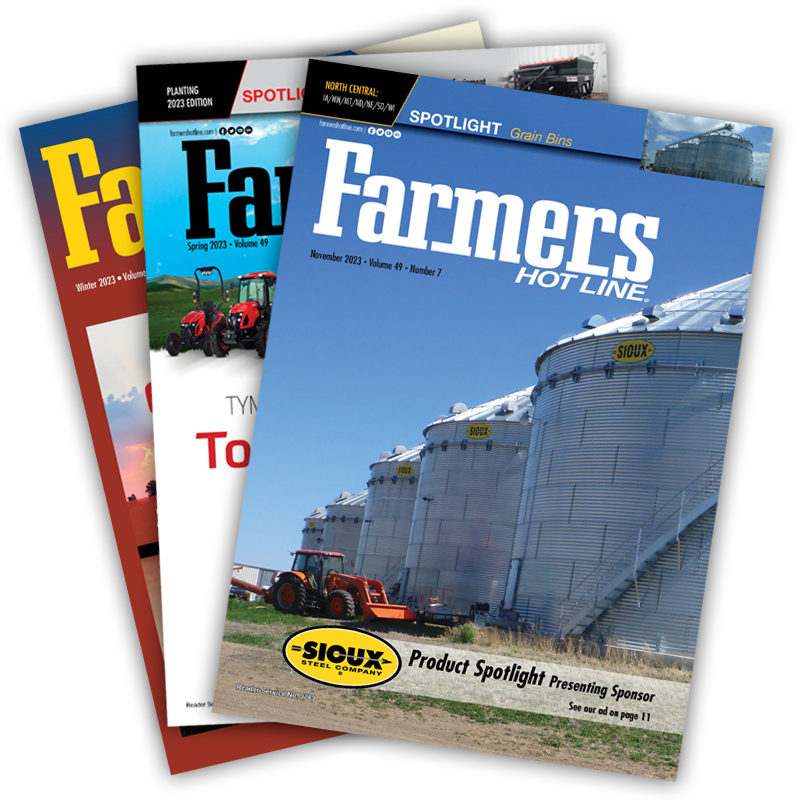Using tech to understand your farm operation
The relationship between Rabo Agrifinance and Conservis is creating new kinds of information for managing all aspects of the farm.
Just what works on your farm? What practice is making you money? What financial information does your lender need for the future? Answering those questions is getting easier as more technology and analysis tools come to agriculture.
In late 2018, farm management software firm Conservis and Rabo AgriFinance announced they were Working together. Just what does that mean for farmers? Farm Progress caught up with Pat Christie, Conservis executive vice president, sales and marketing, and one of the company's founders, to get a better handle on just what this new working relationship might mean.
“When we started to work together, there was a clear purpose of bringing good systems to farmers, and really trying to plug some of the holes to make it easy,” Christie explains. “And over the last year, what we’ve really done is start to connect the dots and link the information from operations to finance.”
He’s clear to say that finance does not mean “accounting,” but greater visibility into the cost of production, variance reporting and linking into accounting systems. “So now the farmer can have their John Deere Operations Center at work, and when they run a piece of equipment, that equipment creates a record,” Christie says. “We can immediately take that record to give the farmer insight financially into how their farms operate.”
That information can help guide an operation to determine which approaches are on plan, and where an operation needs to tweak some practices or management approaches. In addition, the information can provide higher clarity for lenders and other financial partners. “How do I look at ratios? Am I trending positive?” Christie asks.
All that financial ratios, trends and benchmarking talk can sound a little like mumbo jumbo when you’re busy working to get a crop in or out during the season, but Christie says this information has greater value than better reports for your lender.
The sustainability conversation
Christie says that as this greater financial analysis has evolved, he’s found that “this financial data with the operational data is also at the heart of carbon and sustainability language. So, if you only have operational data and not [the financial data], you're kind of missing half the equation for these programs.”
He explains that Conservis is being pulled into a lot of carbon discussions and regenerative practice issues. “We’re being asked, ‘How do you present the regenerative practice? Not only as a practice, but as a profit scheme?’” he says.
What Conservis and Rabo AgriFinance have done is work together to link operational decisions to the financial health of the farm, and realize “that when you have both of those things connected to one place, you can now do a lot of things you couldn’t do before,” Christie says.
He notes that beyond providing enhanced information for your lender, that information has value if you need to report to a supply chain. That could become more important as farmers take advantage of corporate programs that support regenerative practices. For example, General Mills has programs working with growers in different parts of the country to engage in more regenerative approaches. This kind of system can help track those practices for the supply chain, but also provide the farmers reporting data that show if there’s an economic benefit for the farm.
“General Mills is trying to make sure that the regenerative practices they’re trying to push actually have a positive income effect — because if those farmers aren’t making money, they have a supply chain issue,” Christie adds.
Partnership benefits
Some may question what the Rabo AgriFinance-Conservis Partnership means. Christie notes that the partnership has brought three benefits so far.
First, Conservis is getting the farmer’s view in greater detail, allowing for a stronger handle on the ag finance information needed to have more complete datasets that can be used for better decision-making by its customers.
Second, he notes that Rabo is bringing clients to Conservis, providing commercial momentum for the farm management software firm; and Conservis is getting access to the research Rabo conducts globally as well as Rabo’s financial analysts, “to make sure the products we build are actually proper and complete,” Christie says.
And third, Christie says that the relationship is giving Conservis a global view of sustainability. “Rabo is by far taking a leadership view on sustainability at the farm gate,” Christie says. He adds that data privacy in this partnership is critical, noting that farmers maintain their control over information sharing.
Rabo is a wholesale bank that lends money to ag-tech providers, farmers, food companies and processors, and it sits at the farm gate. Christie says that perspective allows Rabo to see both sides of a transaction and creates new business opportunities.
For example, Rabobank is offering organic transition financing to help farmers who want to make that switch get through the process, but what dataset helps determine if that’s a solid financial move for that farm, that can also be used for the bank to know it can properly underwrite that transition loan?
“It’s pulling all those pieces together, which starts to build a seamless system for the farmer to have options, to access capital and try new practices,” Christie says. “And for them to ultimately know their financial health.”


